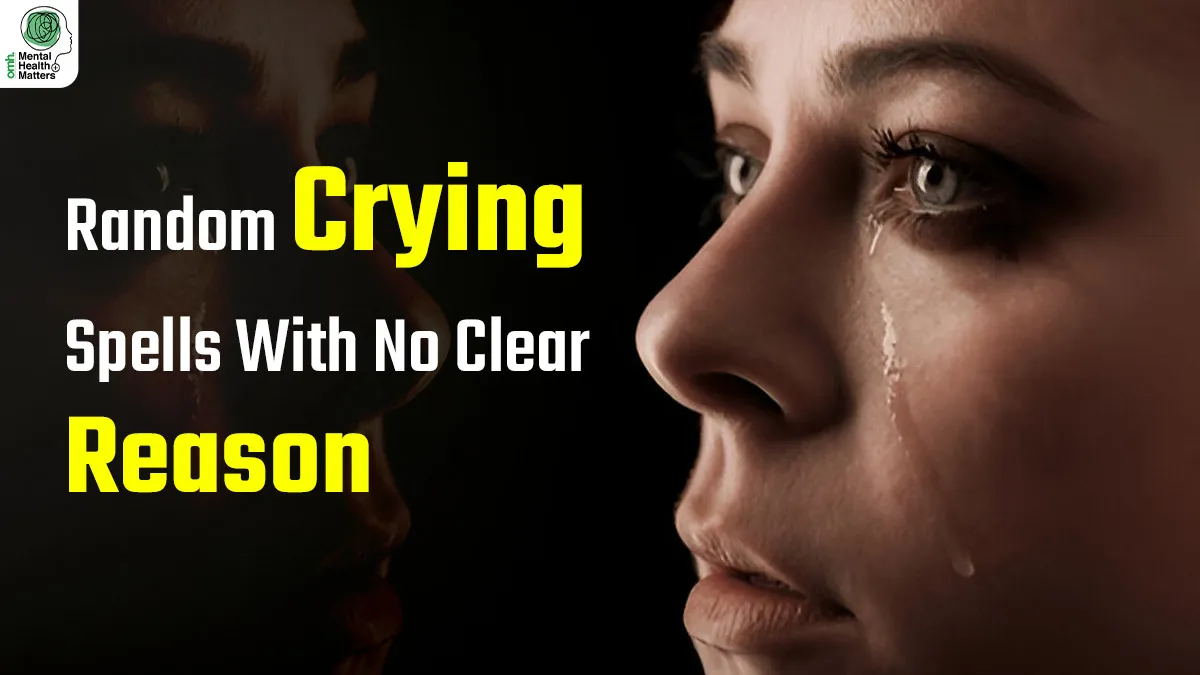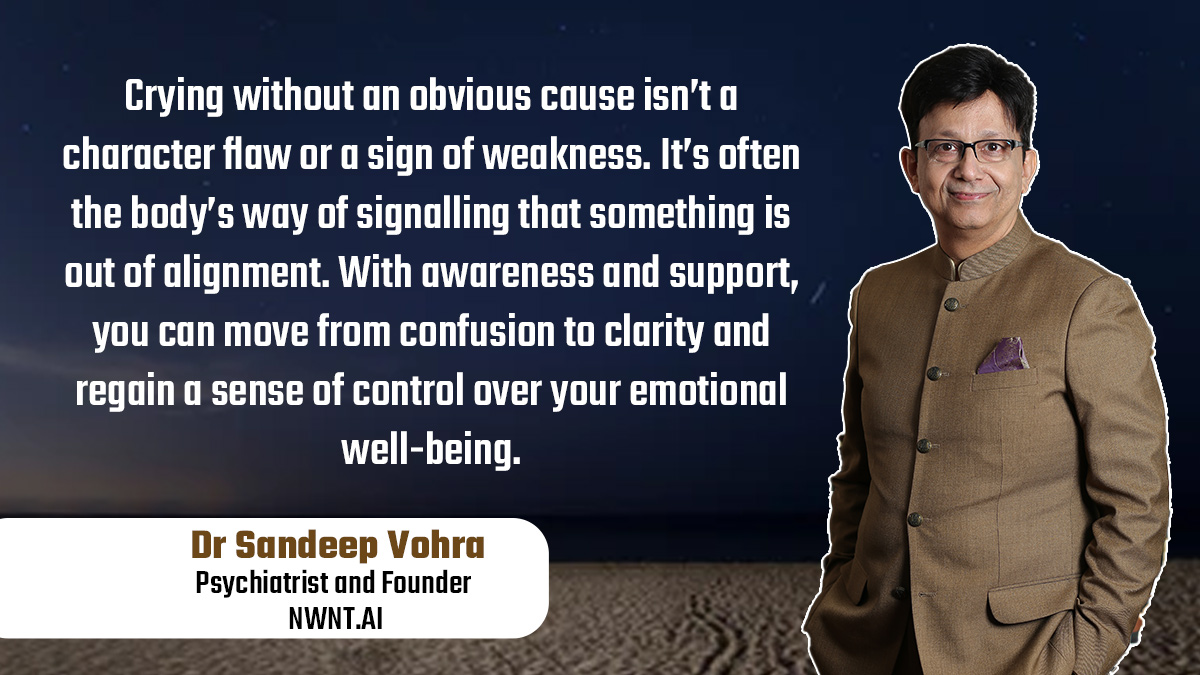
It happened on an ordinary weekday afternoon. You weren’t going through a breakup. No one had died. You didn’t even feel particularly sad until suddenly, you were. Out of nowhere, your eyes welled up, your throat tightened, and a wave of emotion hit you like a gust of wind from an open window. All you could think was: Why am I crying? What is going on with me?
Table of Content:-
CHECK YOUR
MENTAL HEALTH

This week in our ‘Mental Health Matters’ series, we reached out to Dr Sandeep Vohra, Psychiatrist and Founder, NWNT.AI, who explained the reasons behind random crying spells.
You Are Not 'Too Sensitive,' You Are Human

Many people, especially women, experience sudden crying spells that seem to have no real cause. "These moments might creep up during completely mundane tasks: while replying to emails, stuck in traffic, or even laughing with friends. They often come with no warning, no known emotional trigger, and disappear just as quickly," said Dr Vohra.
In our fast-paced world, these moments are often dismissed as signs of being too sensitive, too tired, or just too emotional. But there is growing evidence that what happens during these episodes is not necessarily about stress or vulnerability. There's biology at play. And in many cases, hormones may be the quiet puppeteers pulling the emotional strings.
The Brain-Hormone-Emotion Triangle
“Hormones are not just about periods or pregnancy. They’re chemical messengers that regulate all kinds of functions in your body; sleep, appetite, metabolism, and mood. Two of the main conductors in this emotional symphony are oestrogen and progesterone, which affect serotonin and dopamine levels, your brain's ‘feel-good’ hormones,” explained Dr Vohra.
When these hormones change (and they tend to do so), they influence how your mind deals with and controls emotions. That's why you can be just fine one day, and the next, cry about some random thought or commercial.
This hormonal rollercoaster becomes especially noticeable during life stages like:
- Menstrual cycle
- Pregnancy
- Postpartum recovery
- Perimenopause and menopause
A global survey of 238,114 women across 140 countries found that 64.18% experienced mood swings or anxiety during their menstrual cycle, and 28.61% said symptoms disrupted their daily life consistently. While it didn’t isolate crying spells, the study underscores how widespread emotional disturbances during menstruation are.
Also Read: #ExpertTalk: Do You Wonder Why You Feel Good After Crying? Find Out Here
Reasons Beyond 'Just Hormonal'
It's simple to brush off such episodes as ‘just hormonal,’ but that doesn't make them any less real. Such emotional spikes can be warning signs of underlying conditions. “An example is Premenstrual Dysphoric Disorder (PMDD), a more extreme variant of PMS characterised by extreme mood swings, irritability, and crying jags that disrupt everyday life. Many women live with PMDD for years without realising it’s a clinical condition,” explained Dr Vohra.
Other times, sudden emotional changes can point to underlying thyroid issues, particularly hypothyroidism, which is known to cause fatigue, low mood, and tearfulness. Because these symptoms mimic regular stress responses, they often go unrecognised or misattributed.
The Role of Chronic Stress and Urban Lifestyles

Modern stress only amplifies these effects. Long-term stress increases cortisol, a hormone that disrupts reproductive hormone rhythms and can throw emotional equilibrium off-kilter.
A qualitative study examining conditions in a major Indian city revealed how urban stressors, such as crowded housing, transportation challenges, noise pollution, and financial pressures, negatively affect mental well-being and stress levels. Such an environment is particularly conducive to factors proven to affect hormonal disruption.
When Hormones Follow a Pattern
If you’ve noticed a cycle to your emotional changes, say, feeling low and weepy around ovulation or right before your period, that’s your body’s way of signalling a hormone shift. During the luteal phase (the days after ovulation and before your period), progesterone rises and then drops suddenly, often taking serotonin levels along with it.
This withdrawal can trigger:
- Mood dips
- Crying spells
- Irritability
- Sleep disruption
- Food cravings
It’s not all in your head; it’s in your bloodstream. And tracking your emotional ups and downs alongside your menstrual cycle can provide powerful insight into your body’s natural rhythms.
Also Read: Why Do Some People Cry So Easily?
What You Can Do
If these crying spells begin to feel frequent or overwhelming, it may be time to pay closer attention.
Track Your Cycle and Emotions
Use an app or journal to monitor your period and your emotional patterns. Are you consistently weepy around day 21? Do you feel stable during ovulation but anxious right before your period? Patterns matter, and they help inform both diagnosis and treatment.
See a Hormone-Aware Specialist
Not all doctors are trained to spot the emotional signs of hormonal imbalance. Seek out a gynaecologist or psychiatrist who’s familiar with conditions like PMDD, thyroid disorders, and oestrogen dominance.
Rule Out Other Causes
"Sudden emotional shifts can be triggered by underlying conditions like thyroid dysfunction, vitamin D or B12 deficiency, iron deficiency, or even undiagnosed depression. A basic blood panel can reveal a lot," added Dr Vohra.
Make Gentle Lifestyle Tweaks
Treatment options range from lifestyle changes like better sleep and exercise to therapy or, in some cases, medical support for hormone regulation. What matters most is recognising that these experiences are valid, not imagined and they deserve care.
These changes might sound simple, but when applied consistently, they can significantly improve hormone balance and emotional regulation.
Message From The Expert

"Crying without an obvious cause isn’t a character flaw or a sign of weakness. It’s often the body’s way of signalling that something is out of alignment. With awareness and support, you can move from confusion to clarity and regain a sense of control over your emotional well-being," concluded Dr Vohra.
[Disclaimer: This article contains information provided by an expert and is for informational purposes only. Hence, we advise you to consult your professional if you are dealing with any health issue to avoid complications.]
Also watch this video
How we keep this article up to date:
We work with experts and keep a close eye on the latest in health and wellness. Whenever there is a new research or helpful information, we update our articles with accurate and useful advice.
Current Version